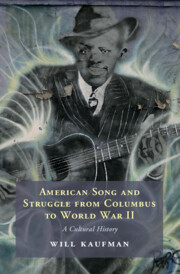Book contents
- American Song and Struggle from Columbus to World War II
- American Song and Struggle from Columbus to World War II
- Copyright page
- Praise for American Song and Struggle
- Dedication
- Contents
- Figures
- Preface
- Acknowledgments
- Introduction
- Chapter 1 Broken Spears and Songs of Sorrow
- Chapter 2 Good Newes from Virginia
- Chapter 3 A Capital Chop
- Chapter 4 If I Had but a Small Loaf of Bread
- Chapter 5 Where Today Are the Pequot?
- Chapter 6 There Is a Fountain Filled with Blood
- Chapter 7 A Tragedy That Beggared the Greek
- Chapter 8 Muscle, Blood, and Steel
- Chapter 9 Rule Anglo-Saxia
- Chapter 10 The Hand That Feeds You
- Chapter 11 We Are Many
- Chapter 12 100% American
- Chapter 13 We’re Up Against It Now
- Chapter 14 The Panic Is On
- Chapter 15 To Thee We Sing
- Conclusion
- Notes and Sources
- Song Index
- General Index
Chapter 2 - Good Newes from Virginia
Published online by Cambridge University Press: 30 July 2022
- American Song and Struggle from Columbus to World War II
- American Song and Struggle from Columbus to World War II
- Copyright page
- Praise for American Song and Struggle
- Dedication
- Contents
- Figures
- Preface
- Acknowledgments
- Introduction
- Chapter 1 Broken Spears and Songs of Sorrow
- Chapter 2 Good Newes from Virginia
- Chapter 3 A Capital Chop
- Chapter 4 If I Had but a Small Loaf of Bread
- Chapter 5 Where Today Are the Pequot?
- Chapter 6 There Is a Fountain Filled with Blood
- Chapter 7 A Tragedy That Beggared the Greek
- Chapter 8 Muscle, Blood, and Steel
- Chapter 9 Rule Anglo-Saxia
- Chapter 10 The Hand That Feeds You
- Chapter 11 We Are Many
- Chapter 12 100% American
- Chapter 13 We’re Up Against It Now
- Chapter 14 The Panic Is On
- Chapter 15 To Thee We Sing
- Conclusion
- Notes and Sources
- Song Index
- General Index
Summary
Songwork is central to the project of Elizabethan settler colonialism, with English ballads justifying the violence of conquest and reinforcing the stereotypes of Indigenous “savagery” in the Virginia colony. With the introduction of kidnapped Africans as slaves in 1619, the mysteries of African song become the preoccupation of British commentators, who can make neither head nor tail of it. Music becomes a site of colonial policing with the prohibition of African drumming and the attempted control of song. Yet the songs of the oppressed are not wholly stilled, neither in the fields and praise houses of the African bondspeople, nor in the ballads of indentured servants from the prisons and poorhouses of the British Isles. Meanwhile, on the fringes of the Plymouth colony in Massachusetts, iconoclast Thomas Morton establishes his Merrymount settlement and infuriates the Puritan elders with his maypole and his bacchanalian ballads, marking perhaps the first instance of secular song as a challenge to the governing establishment. The musical soundscapes of two wars of Puritan conquest – the Pequot War and King Philip’s War – are set against the wars between hymnody and psalmody in the Puritan church. The songs of Bacon’s Rebellion and the poor dragoons of the French and Indian War conclude the chapter.
Keywords
- Type
- Chapter
- Information
- American Song and Struggle from Columbus to World War 2A Cultural History, pp. 17 - 40Publisher: Cambridge University PressPrint publication year: 2022

